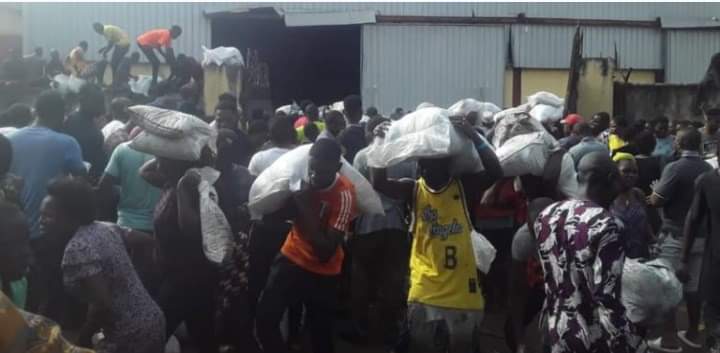As a fallout of the legitimate #ENDSARSNOW protests and their subsequent degeneration into disturbances, anarchy (leading to arsons and jungle justice acts of murder), and then the unfortunate state-violence leading to murder of citizens by security agents in different places, we have also seen a sudden rise in the alarming discoveries of “food banks” leading to spate of looting of public warehouses and stores across different States in the South of Nigeria. The unfortunate events of the past weeks, particularly the latest criminal acts of looting of food items and other supplies carefully stockpiled in different public warehouses, have helped to further expose the fragility of the Nigerian State and the tensed situation between the few haves and the multitudes of have-nots in the society. Put differently, these events have removed all doubts about the level of discontents in the land from the poverty stricken masses who are in the majority and against the few elites feeding fat on the commonwealth.
To be sure, the spate of looting of the supposed COVID-19 palliatives from different public warehouses and stores across different States in Nigeria is nothing but acts of criminality that could well earn the perpetrators some terms of imprisonment under the criminal laws of the affected States. However, the kind of “public” support and applause that the acts of criminality (looting of public warehouses) have enjoyed appear to have overwhelmed the States to submission, thereby frustrating the capacity of the States to either resist the crimes or apprehend the perpetrators. In fact, the States have become helpless.
But why have the people been so emboldened to commit these crimes of looting the public warehouses of food items? Why have the people been so brazen to cart away food items and other supplies as we have seen in different videos? Why have those in governments decided to keep and failed to share the palliatives weeks after they received and warehoused them? Why have the bureaucracies of distribution of the palliatives taken so long even as the targeted or supposed beneficiaries were/are dying of hunger? Are the people justified to commit the crimes of looting of the food items? Clearly, there are more questions as there are answers.
One of the immediate answers to the above last question on whether or not the people are justified to commit the crimes, is to attribute the acts of criminality here to the unpardonable level of poverty in the land. Yes, poverty in the land is a plausible explanation here, but this explanation itself poses another question of whether or not poverty is enough to justify the acts of criminality or any criminality at all. The answer to this latter question requires a value judgement that is neither here nor there. This value judgement criminologists have tried to explain by their classification and explanation of crimes.
Therefore, in the sociological study of crimes and acts of defiance in the society, certain social structural factors such as poverty and social disorganisation can validly explain, if not justify, the incidences of some crimes called consensus crimes. These are crimes that almost everyone is defiant to their legal consequences. People simply deviate from the norm almost spontaneously. They are the sort of crimes which evoke near-unanimous public agreement. Such crimes are so classified because of their perceived non-severe harmfulness, the degree of consensus concerning the norms violated or deviated from, and the severity of the response to them. For example, does the Nigerian populace of the common folks see the looting of the warehouses of food supplies as something reprehensible or severe or harmful to anyone or the public? No. Does that make the looting non-criminal acts? No.
So, given the level of support and seeming consensus from the public, can the ongoing looting spree across different public warehouses in some States be regarded as consensus crimes? I think YES! For clarity, arson, murders and like crimes that we have equally seen in the recent time DO NOT fit into the ball of what sociologists and criminologists call consensus crimes. Crimes such as arson, murders, and the likes are generally regarded as morally intolerable, injurious, severe, and subject to harsh penalties. Looting of public warehouses for foods by hungry or desperate or angry members of the public, on the other hands, will definitely be viewed as more tolerable and less harmful – if harmful at all, than destruction of public properties by the same people.
This then brings me to my last question. Will the States at some auspicious time in the nearest future go after the perpetrators of the acts of criminality (looting of public warehouses) in order to serve as a deterrence to others in the future? I don’t think so. While it is necessary that States take steps to enforce their laws and punish acts of criminality to deter others, I do not think the States will be justified at this time and in the present circumstances to take that routes with respect to the looting of the public warehouses of food items by hungry and justifiably angry people.
Why do I think so? Because I am convinced that the looting of those public warehouses are consensus crimes as I have explained above. I am not in the least justifying the acts of criminality. I am simply explaining them. The States should just move on and learn lessons to prevent future occurrences that could be worse than we have witnessed at this time. How many people can the States prosecute in the circumstances of the consensus crimes that we are seeing now?
Going forward, the States should just take definite steps to bridge the widening gap between the haves and the have-nots. The States should make efforts to pull down every factors of DELAY in the bureaucracies of supporting the poor and the needy. As a matter of fact, I do not think any public support that is worthy of being called palliatives should take more than 78hrs between the time of receipt and distribution to the rightful beneficiaries.
Why stockpiling food items and allowing the bureaucracies of delay in their distribution to the beneficiaries, in the midst of palpable poverty side by side with opulence in the land? Why????
The Looting of Public Food Warehouses and Consensus Crimes!
As a fallout of the legitimate #ENDSARSNOW protests and their subsequent degeneration into disturbances, anarchy (leading to arsons and jungle justice acts of murder), and then the unfortunate state-violence leading to murder of citizens by security agents in different places, we have also seen a sudden rise in the alarming discoveries of “food banks” leading to spate of looting of public warehouses and stores across different States in the South of Nigeria. The unfortunate events of the past weeks, particularly the latest criminal acts of looting of food items and other supplies carefully stockpiled in different public warehouses, have helped to further expose the fragility of the Nigerian State and the tensed situation between the few haves and the multitudes of have-nots in the society. Put differently, these events have removed all doubts about the level of discontents in the land from the poverty stricken masses who are in the majority and against the few elites feeding fat on the commonwealth.
To be sure, the spate of looting of the supposed COVID-19 palliatives from different public warehouses and stores across different States in Nigeria is nothing but acts of criminality that could well earn the perpetrators some terms of imprisonment under the criminal laws of the affected States. However, the kind of “public” support and applause that the acts of criminality (looting of public warehouses) have enjoyed appear to have overwhelmed the States to submission, thereby frustrating the capacity of the States to either resist the crimes or apprehend the perpetrators. In fact, the States have become helpless.
But why have the people been so emboldened to commit these crimes of looting the public warehouses of food items? Why have the people been so brazen to cart away food items and other supplies as we have seen in different videos? Why have those in governments decided to keep and failed to share the palliatives weeks after they received and warehoused them? Why have the bureaucracies of distribution of the palliatives taken so long even as the targeted or supposed beneficiaries were/are dying of hunger? Are the people justified to commit the crimes of looting of the food items? Clearly, there are more questions as there are answers.
One of the immediate answers to the above last question on whether or not the people are justified to commit the crimes, is to attribute the acts of criminality here to the unpardonable level of poverty in the land. Yes, poverty in the land is a plausible explanation here, but this explanation itself poses another question of whether or not poverty is enough to justify the acts of criminality or any criminality at all. The answer to this latter question requires a value judgement that is neither here nor there. This value judgement criminologists have tried to explain by their classification and explanation of crimes.
Therefore, in the sociological study of crimes and acts of defiance in the society, certain social structural factors such as poverty and social disorganisation can validly explain, if not justify, the incidences of some crimes called consensus crimes. These are crimes that almost everyone is defiant to their legal consequences. People simply deviate from the norm almost spontaneously. They are the sort of crimes which evoke near-unanimous public agreement. Such crimes are so classified because of their perceived non-severe harmfulness, the degree of consensus concerning the norms violated or deviated from, and the severity of the response to them. For example, does the Nigerian populace of the common folks see the looting of the warehouses of food supplies as something reprehensible or severe or harmful to anyone or the public? No. Does that make the looting non-criminal acts? No.
So, given the level of support and seeming consensus from the public, can the ongoing looting spree across different public warehouses in some States be regarded as consensus crimes? I think YES! For clarity, arson, murders and like crimes that we have equally seen in the recent time DO NOT fit into the ball of what sociologists and criminologists call consensus crimes. Crimes such as arson, murders, and the likes are generally regarded as morally intolerable, injurious, severe, and subject to harsh penalties. Looting of public warehouses for foods by hungry or desperate or angry members of the public, on the other hands, will definitely be viewed as more tolerable and less harmful – if harmful at all, than destruction of public properties by the same people.
This then brings me to my last question. Will the States at some auspicious time in the nearest future go after the perpetrators of the acts of criminality (looting of public warehouses) in order to serve as a deterrence to others in the future? I don’t think so. While it is necessary that States take steps to enforce their laws and punish acts of criminality to deter others, I do not think the States will be justified at this time and in the present circumstances to take that routes with respect to the looting of the public warehouses of food items by hungry and justifiably angry people.
Why do I think so? Because I am convinced that the looting of those public warehouses are consensus crimes as I have explained above. I am not in the least justifying the acts of criminality. I am simply explaining them. The States should just move on and learn lessons to prevent future occurrences that could be worse than we have witnessed at this time. How many people can the States prosecute in the circumstances of the consensus crimes that we are seeing now?
Going forward, the States should just take definite steps to bridge the widening gap between the haves and the have-nots. The States should make efforts to pull down every factors of DELAY in the bureaucracies of supporting the poor and the needy. As a matter of fact, I do not think any public support that is worthy of being called palliatives should take more than 78hrs between the time of receipt and distribution to the rightful beneficiaries.
Why stockpiling food items and allowing the bureaucracies of delay in their distribution to the beneficiaries, in the midst of palpable poverty side by side with opulence in the land? Why????
Misbau Alamu LATEEF, Ph.D.




